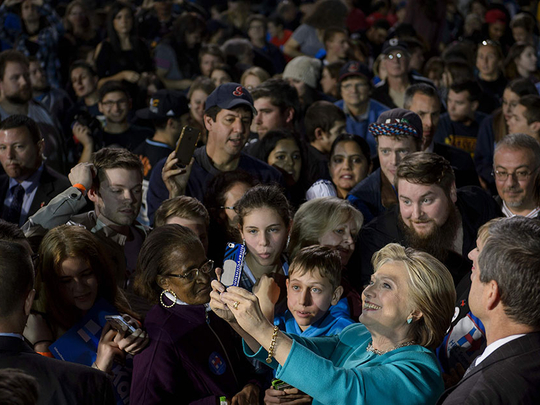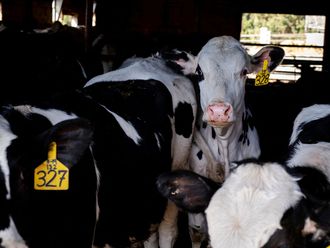
Washington: They campaigned urgently, even frantically, at airfields and arenas, on a college campus in Wisconsin and in a Philadelphia church. Hillary Clinton and Sen. Tim Kaine, their prospects brightened by news that the FBI had found no new troublesome emails in a review of Clinton’s private server, pleaded with Americans on Sunday to get out and vote as if their very way of life were on the line.
Scrambling across the electoral map, Donald Trump and his running mate, Gov. Mike Pence of Indiana, addressed supporters in darker and even graver terms, with Trump casting the election as a now-or-never moment for his brand of right-wing nationalism.
Surpassing the anxious entreaties of an ordinary presidential race, Clinton and Trump begged voters to see the 2016 election as a choice of almost apocalyptic significance. Trump called the vote on Tuesday a final chance to turn back foreign forces menacing American identity, while Clinton said the country’s long journey toward equality for women and minorities was at risk of being reversed in a day’s balloting.
Clinton began her day in Philadelphia, speaking at the Mount Airy Church of God in Christ with Sen. Cory Booker of New Jersey, a fellow Democrat. In a city where high black turnout could seal her grip on the presidency, Clinton framed the campaign in the context of historic struggles for equality — from the origins of the women’s rights movement in Seneca Falls, New York, to the march for black civil rights in Selma, Alabama.
“Everything you care about, everything I care about and have worked for, is at stake,” Clinton said, without mentioning Trump.
Clinton has delivered a broad message of national unity in the closing days of the campaign, offering herself to voters as an avatar of tolerance and reconciliation, in contrast to Trump. She campaigned Sunday in New Hampshire with Khizr Khan, the father of an Army captain slain in Iraq, whose speech in July castigating Trump as biased against Muslims and immigrants electrified the Democratic National Convention. Khan branded Trump as a figure of exclusion and division, asking of him, rhetorically: “Would anyone who is not like you have a place in your America?”
Trump, for his part, warned voters that they would never again see a candidate like him within reach of the presidency. At a midday rally in Sioux City, Iowa, Trump said over and over that he represented a “last chance” for voters angry about foreign trade and immigration.
“The media, Wall Street and the politicians are trying to stop us, because they know we will fix the rigged system,” he said.
The announcement from James Comey, the FBI director, reaffirming his assessment that Clinton should not be charged with a crime over her handling of classified information, came as a blow to Trump and other Republicans hoping that a pre-election bombshell would upend Clinton’s campaign.
As it stands, Clinton appears to be entering Election Day as a solid if not overwhelming favourite, even as the race has narrowed over the past few weeks. A poll published Sunday by NBC News and The Wall Street Journal found her ahead of Trump by 4 percentage points nationally, and she maintains a clear upper hand in the Electoral College.
And Clinton appears to be benefiting from a surge in participation by Latino voters as well as unusually high enthusiasm among women. Early voting by Latinos may have already given Clinton a decisive lead in the swing state of Nevada, as well as a meaningful edge in Florida, a state without which Trump has no path to the presidency.
Clinton and her leading surrogates have also been making a last-minute appeal asking voters to embrace the idea of a female president, seeking to increase her lead among women and to persuade some hesitant men to discard their reservations about Clinton’s gender.
Campaigning in Florida over the weekend, Kaine accused Trump of tapping into sexism as a political tactic. He reproached Trump for saying at a rally that military officers would not want to follow orders from Clinton, and for suggesting that she did not look presidential.
In Wisconsin on Sunday, Kaine hailed the historic nature of Clinton’s candidacy and urged confident Democrats not to take victory for granted.
“If it had been easy for there to be a woman president of the United States, there would have been a woman president of the United States,” he said.
The Clinton campaign also booked national airtime during football games on Sunday night to run a pair of commercials featuring men who said they could not vote for Trump because of his treatment of women.
And Clinton campaigned this weekend with two singers, Katy Perry and BeyoncE, who have hailed her as a barrier-breaking candidate.
Tom Bonier, a Democratic data strategist and the chief executive of the firm TargetSmart, said there was ample evidence that women were “especially motivated to vote in this election.” He added that enthusiasm from female voters alone could push Clinton’s final vote tally a point above where she stands in public polls.
“In every single battleground state, women not only make up a clear majority of ballots cast thus far, but the female share of the electorate is larger than it was in the 2012 election,” he said.












